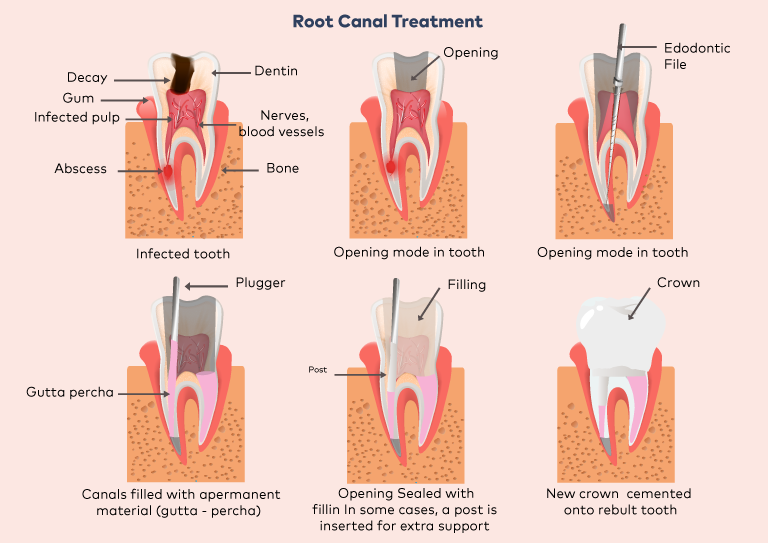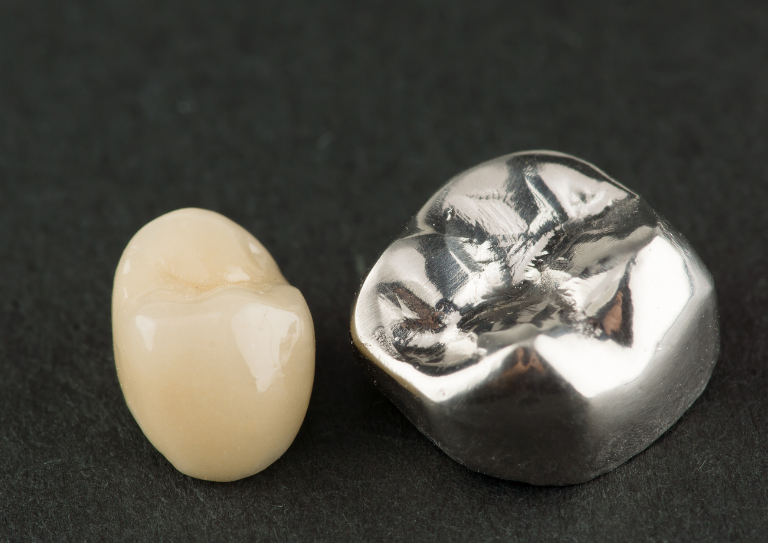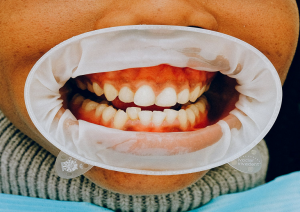Root canal treatment is performed when the pulp, which is composed of nerves and blood vessels in the tooth, becomes infected or damaged. During root canal treatment, the inflamed or infected pulp is removed and the inside of the tooth is carefully cleaned and disinfected, then filled and sealed.

In this article, Dr Pearlyn Pan (Associate Dentist, DP Dental) and Dr Susie Zhang (Associate Dentist, DP Dental), answer some frequently asked questions about root canal treatment.
How do you know if a root canal is needed?
Dr Pearlyn Pan: These are a few symptoms that mean you might need a root canal:
- Severe pain that comes on spontaneously
- Lingering sensitivity to hot or cold, even after the sensation has been removed
- Severe pain while chewing or biting
- Swollen gums
- A persistent pimple on the gums
- Tooth discolouration; trauma to the tooth can damage the roots and give the tooth a greyish appearance. This discolouration is easier to see in a front tooth.
As dentists, we will be able to help you determine if you require a root canal through:
- Identifying swollen gums and/or pimple on the gums
- Identifying cracked or chipped tooth
- Identifying the discoloured problem tooth
- Through percussion tests – tapping on the problem tooth
- Testing for sensitivity through application of cold stimuli to the tooth
- X-rays
Is root canal treatment better than extraction?
Dr Susie Zhang: This depends on the condition of the tooth. We would always try to preserve your natural tooth for as long as possible (no replacement tooth comes close to natural tooth!)) as once you extract, the tooth is gone forever.
Severe toothaches are frequently the result of an infection or damage in a tooth’s pulp, its innermost chamber. The nerve inside the tooth becomes irritated, and it sends massive pain signals to the brain. An extraction handles the problem by removing the tooth, including the infected tissue and the nerve that was responsible for the pain.
Root canal treatment is a more conservative treatment. The infected nerve tissue is carefully cleaned out and disinfected through an access hole on the chewing surface, thereby preserving the rest of the tooth. Root canal treatment these days have a high success rate and the high spec technology we have at DP Dental (microscope to allow us to see 40x zoom; and laser to disinfect the root canal system) means there are little to no complications associated with the procedure.
There are some teeth, however, that are deemed unrestorable and extraction would be the only option.
A tooth extraction does cost less than root canal treatment. However, in order to prevent jawbone deterioration and drifting of adjacent teeth, you should consider getting a dental implant to replace the lost tooth. Implants are a remarkable treatment, but they can cost a significant amount of money. Because root canal treatment keeps your natural tooth in place, it eliminates the need for later tooth replacement and can save you money in the long run.
Is pain after root canal treatment normal?
Dr Susie Zhang: Discomfort is expected after root canal treatment. If you have some minor pain for a few days, don’t stress. This is normal and can be managed by mild analgesics likes Ibuprofen. It should settle on its own once the post-operative inflammation has healed. Most of our patients stop taking painkillers by day two.
However, if you have intense, sharp pain that persists for over 1-2 weeks, this is usually not normal. We would advise to come in for a check in case of underlying issues (e.g. unnoticed cracks, missed root canals etc).

Do you need to put a crown on your tooth after root canal treatment?
Dr Pearlyn Pan:
A crown is a custom-made protective covering for a tooth, which is made out of either ceramic or metal. It covers the exposed portion of a tooth in order to protect it from biting forces.
A tooth that needs root canal therapy is often one that has a large filling or extensive decay – it is already weak. A root canal procedure (which involves drilling to remove the infected pulp) could further weaken it, and make it more brittle and susceptible to fractures.
A crown is thus needed to protect the tooth from the forces of biting down, and to prevent it from breaking. If there is no crown, the tooth may crack and require an extraction.
The need for a crown after a root canal also depends on the location of the tooth in the mouth. Teeth towards the back of the mouth like molars and premolars are used for chewing, and generally require crowns. Crowns aren’t usually critical for the front teeth as the biting forces are not that strong.
Sometimes, tooth decay or an injury may cause the tooth to become discoloured. In such a case, a crown may be placed for cosmetic reasons.
Do you have more questions/concerns about root canal treatment? Feel free to contact us at 6282 012 or WhatsApp at 9012 8562 to schedule an appointment.




